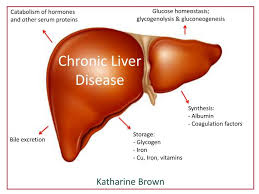+918048047807

This is your website preview.
Currently it only shows your basic business info. Start adding relevant business details such as description, images and products or services to gain your customers attention by using Boost 360 android app / iOS App / web portal.
Chronic Liver Disease | Cirrhosis What is cirrhosi...

Chronic Liver Disease | Cirrhosis What is cirrhosis? Cirrhosis is when scar tissue replaces healthy liver tissue. This stops the liver from working normally. Cirrhosis is a long-term (chronic) liver disease. The damage to your liver builds up over time. The liver is your body’s largest internal organ. It lies up under your ribs on the right side of your belly. The liver does many important things including: Removes waste from the body, such as toxins and medicines Makes bile to help digest food Stores sugar that the body uses for energy Makes new proteins When you have cirrhosis, scar tissue slows the flow of blood through the liver. Over time, the liver can’t work the way it should. In severe cases, the liver gets so badly damaged that it stops working. This is called liver failure. What causes cirrhosis? The most common causes of cirrhosis are: Hepatitis and other viruses Alcohol abuse Nonalcoholic fatty liver disease (this happens from metabolic syndrome and is caused by conditions such as obesity, high cholesterol and triglycerides, and high blood pressure) Other less common causes of cirrhosis may include: Autoimmune disorders, where the body’s infection-fighting system (immune system) attacks healthy tissue Blocked or damaged tubes (bile ducts) that carry bile from the liver to the intestine Use of certain medicines Exposure to certain toxic chemicals Repeated episodes of heart failure with blood buildup in the liver Parasite infections Some diseases passed from parent to child (inherited diseases) may also cause cirrhosis. These may include: Alpha1-antitrypsin deficiency High blood galactose levels Glycogen storage diseases Cystic fibrosis Porphyria (a disorder in which certain chemicals build up in the blood) Hereditary buildup of too much copper (Wilson disease) or iron (hemochromatosis) in the body What are the symptoms of cirrhosis? Your symptoms may vary, depending on how severe your cirrhosis is. Mild cirrhosis may not cause any symptoms at all. Symptoms may include: Fluid buildup in the belly (ascites) Vomiting blood, often from bleeding in the blood vessels in the food pipe (esophagus) Gallstones Itching Yellowing of the skin and eyes (jaundice) Kidney failure Muscle loss Loss of appetite Easy bruising Spider-like veins in the skin Low energy and weakness (fatigue) Weight loss Confusion as toxins build up in the blood The symptoms of cirrhosis may look like other health problems. Always see your healthcare provider to be sure.

